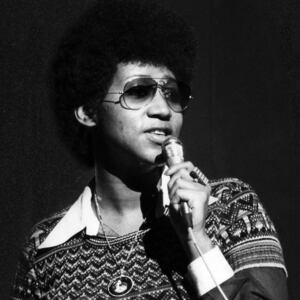Both Travisville, opening tonight at the Ensemble Studio Theatre, and Fireflies at the Atlantic Theater Company (opening Monday), focus on the fight for black civil rights in the 1960s, and the interplay of the personal and political as struggles for change and equality unfold against backdrops of violence and intimidation.
Travisville, written by William Jackson Harper (presently starring as Chidi in The Good Place), is such a good, tight play that this critic throughout its two-hour duration imagined a bigger life for, whether that be on Broadway or on the big screen. Barring a strange deflation of storytelling towards the end (it feels like the play doesn't know when or how to end right), it is a polished jewel of writing and acting, and carried by some sharp and distinctive performances from its cast of nine.
On a very small, simple stage featuring a couple of benches, a few chairs and tables, with five windows with blinds drawn, director Steve H. Broadnax III, takes us to Dallas in 1964. The Civil Rights Act has passed, and Dallas’ segregated black population is facing being uprooted by developers wanting to gentrify their neighborhood.
The figureheads leading the African-American community are pastors and leaders from the local churches. Until now, they have maintained a watchful peace with the city’s white powerbrokers, with one side playing softly-softly with the other. It’s an uneasy peace, but it has held.
Enter Zeke Phillips (Sheldon Best), a passionate radical activist from Atlanta, furious at the threats to the community, the low-cost blackmail to get them to vacate their homes, their displacement for white profit, and the stinking of entitlement and racism emanating from the white developers and politicians, who care so little for black lives and black communities.
“It’s just so strange,” he says of the community. “Everyone is very cordial. Very polite. White folks, Negroes everybody, however I still feel as though I have stepped back in time.”
Best captures Zeke’s resolute anger brilliantly, skewering both the white hypocrisy and double-talk of Jaston Honeycutt, the landowner trying to force his vision for Travisville through, and also the inaction and passivity of the black pastors.
Denny Dale Bess, who plays Honeycutt so well (and not, as he could, as a pantomime villain), also plays (with equal care) Mayor Ainsley Gillette, who is always wheedling for understanding from the pastors. There is comedy in his scenes, and also in the domestic scenes of husbands and wives and church-based scenes with the pastors.
The play doesn't wring its hands; it interrogates a moment in history, populated not by heroes and villains but real people negotiating dangerous quandaries. Stylistically, scenes run into one another; the words of one character blanketed by the next. It's an effective technique sometimes, and a little irritating at others.
Harper's deeper focus is the schism and questioning within the black community itself, about the best way forward and the best form of resistance at a time of such threat.
Brian D. Coats as Elder Alden Hearst is the thunderous, forbidding embodiment of the old guard: do not upset the applecart, keep the nervous status quo steady. Hearst is reasonably afraid of the bloody consequences of asking or asserting for more, and he his own tyrant, squashing dissent (even when eating some cake) from the likes of Gunn (Nathan James), a minister with a tragic past.
A ripple of post-Kavanaugh-hearing recognition rumbled through the audience when Hearst noted that “White man can get behind a microphone, spitting mad, say whatever comes into his head, folks applaud, call him a straight shooter. Don’t matter if it’s inarticulate rambling. We don’t have that luxury... We get labeled as dangerous, and then our very survival is at stake. The onus is on you and me to remain dispassionate, and noble. That is how we get what we want.”
But Hearst is also very ill, and grooming his successor, Ora Fletcher (Bjorn DuPaty); Ora is much more torn. He is younger, and so feels closer to Zeke’s passion. Black people may finally have federal protection, he says, but, tell that to the city as it wrecks their community.
But he also respects Hearst, and he also does not want the community to suffer any more than it has. His wife Bethany (Stori Ayers) is pregnant, and Ora wants to be a present husband and father, not a dead one. A member of the community Laverne (Ayers, in another role), remembers the deaths by firebombing and the accident that was no accident that befell her own husband at the hands of racists.

But what price acquiescence? What price a quiet life? That question is asked most emphatically by Georgia Dawson (a stunning, standout performance by Lynnette R. Freeman), who—with her husband Orthell (Shawn Randall), an owner of an auto shop—become the last holdouts to the developers.
What we see, and the black characters come to see, is that the status quo they have been living under is nothing of the sort. It is just a racist padded boot to the neck. The menace of violence, the menace of having much more than their homes taken away, is made clear to them. Soon, that violence will come close to a character’s home: blood will be spilled.
Dawson is raw and believable as a loyal but realistic wife transformed to impassioned truth-teller. The end of the play falls away rather, but its central questions remain relevant today: how important are our communities? How brave must we be? How resolute should resistance be? And when is there nothing left to do, when every trespass on reason and decency has been executed, what is there to do but make a stand and assert a right to be, and a resolve to stay strong.
Travisville is at Ensemble Studio Theatre, 545 West 52nd Street, NYC, until October 28.







